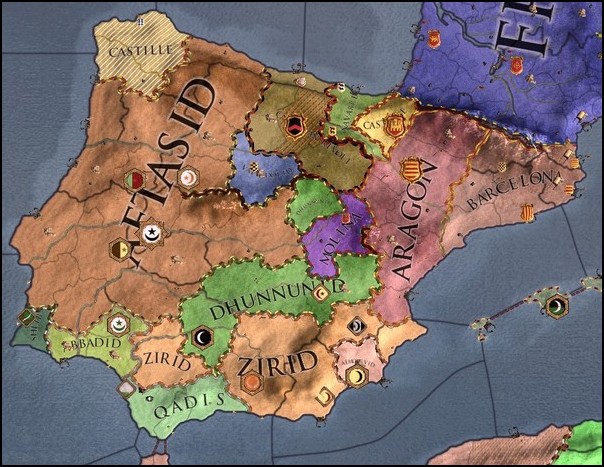Part 3: Son of Iblis
Chapter 3 - The Son of Iblis - 1086 to 11061087 opens with disaster in the Holy Land. After five years of religious warfare and holy fury, Basileus Konstantios of the Eastern Roman Empire strode into Jerusalem at the head of an army, having decisively defeated the Fatimid Caliph on the drenched battlefields of Palestine.
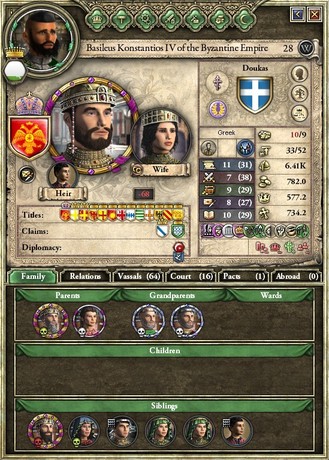
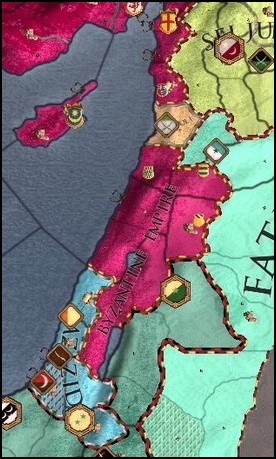
With his Shia rival humiliated, the Sunni Caliph decided to capitalise on his weakness by promoting his own legitimacy, calling on all true Muslims to take up arms against the infidel in a public sermon.

Meanwhile, in Western Europe, the other half of the Roman Empire was in the midst of its own wars. After seizing the throne and forcing the Pope to crown him Emperor, Manfredo the Italian embarked on an ambitious campaign to destroy the Norwegian Empire, his biggest threat and rival within Catholicism.
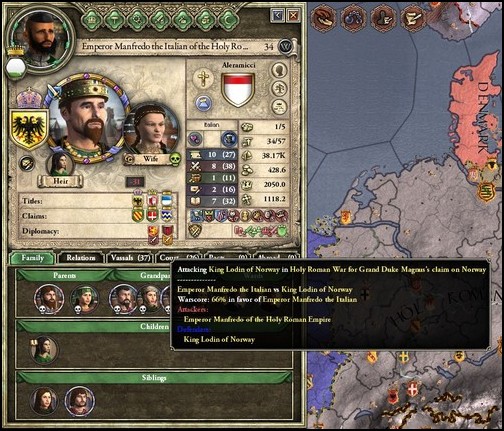
And after a series of stunning victories in Saxony and Denmark, Emperor Manfredo managed to defeat his rivals, leaving the north embroiled in peasant uprisings and widespread rebellions. The High King of Norway-England was killed during the chaos, and his only living son, Lodin, was forced to flee to London to escape the wrath of his enemies, abandoning most of his Scandinavian holdings as he did so.

Finally, back on the Iberian peninsula, the Aftasid Sultanate is steadily expanding both northward and eastwards, at the expense of the Christian principalities. The Sultanate grows stronger by the day and seems destined to dominate all of Hispania, unless a power rises to challenge them.
And that is exactly what the Sheikh of Cádiz, Az’ar Jizrunid, intends to do. He had thus far rocketed to dominate Iberian politics, with rumours about his notorious cruelty and battlefield brilliance becoming court gossip, but Azar's eyes were set on the future. After defeating the Abbadid Emir, Sheikh Az’ar returned to his court to begin planning his next war, but with him he brought the seeds of trouble and unrest.
News that Az'ar had brought back three heathen women was immediately met with anger across Cádiz, though most prominently from the clergy. It wasn't unusual that a sheikh or emir might have foreign women as part of his harem, but it was forbidden for a Muslim to lie with a pagan, and there were dark stories about these three women in particular. After consulting his colleagues, the head of the ulema, Imam Mubashir, informed Sheikh Az’ar that the women would have to be exiled, such was the will of Allah.
Nobody seemed to understand that Az’ar didn’t care for the will of Allah, however, his prayers were directed to a different being altogether.
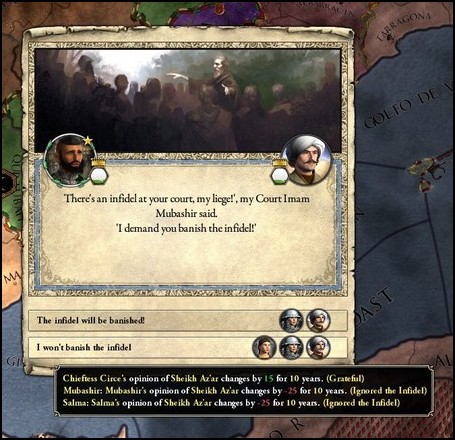
Az’ar, however, went even further than this. Just days after returning to court, the Sheikh announced to his courtiers and retainers that he intended to marry the three women, once again drawing criticism and anger from an infuriated clergy.
And that he did, the very next morning. Az'ar wedded Jezebel and Circe in a widely-publicised ceremony, and though he was unable to officially marry Morgana without breaking yet more Quranic laws, the two were undoubtedly involved with one another behind closed doors.


In fact, Az’ar went a step beyond simply infuriating his clergy, he seemed to be openly defying the law of Allah when he awarded his new wives with high-ranking positions and honours. They were all given places on the Sheikh’s Council, making the displaced viziers instant enemies of Az’ar.
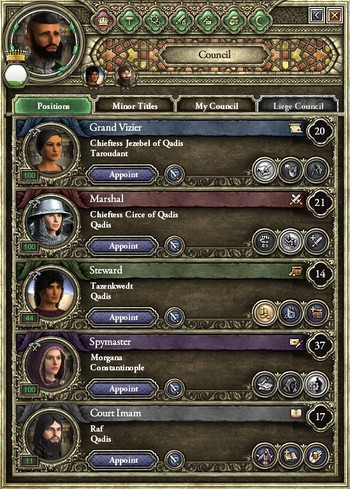
There were immediate repercussions, with officers and soldiers in Azar’s army outright refusing to serve a woman, and an infidel woman at that. Rumours of corruption on Circe’s part became widespread, but Az’ar dismissed them all as attempts to besmirch her reputation.

Eventually, after realising their protests were being ignored, a few commanders escaped the capital and raised an army in revolt, proclaiming that the three women had bewitched Az’ar, and that the only way to be rid of the curse was to kill them all.
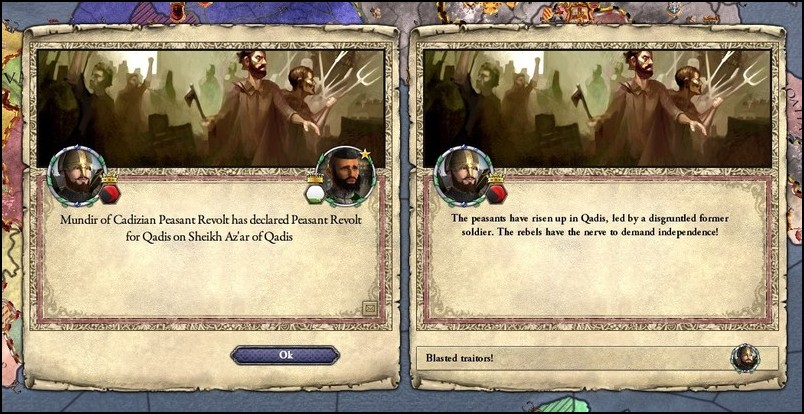
Az’ar, needless to say, was not impressed. The army his former commanders raised was surprisingly large, but it was also made up of retired soldiers and untrained peasants, so he was certain they would make a poor showing when it came to battle.
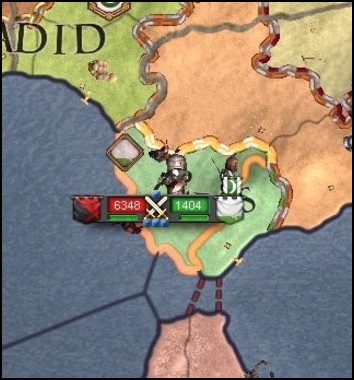
That said, Az’ar wasn’t one to shy away from the prospect of a fight, he relished any opportunity that allowed him to wet his blade. So he called on the veterans of his recent war to help him squash the revolt, and after a short march and a shorter battle, the rebels were wiped out.
Even better, in the midst of all the fighting, Az’ar had been able to corner the leader of the revolt - a former mercenary by the name of Mundir. After disarming him in the short struggle that followed, Az’ar ordered his men to put him in chains, intending to march him back to Cádiz to face his wives.
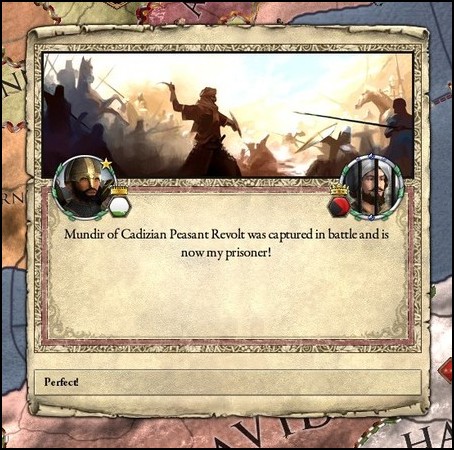
Azar’s victorious return to Cádiz, however, was not met with cheering this time. Instead, the palace was in a state of mourning, with every courtier terrified as to what the Sheikh would do, once word of what happened finally reached him.
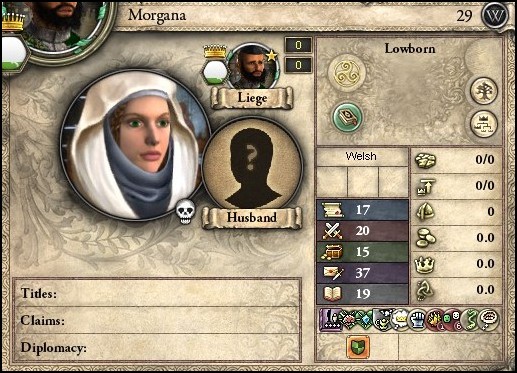
Apparently, just days after Az’ar left Cádiz to engage the rebels, Morgana had been found dead in her rooms. There were no signs of injuries on her, but the other two witches convinced the Sheikh that she had been assassinated, probably by way of some obscure poison.
Az’ar, of course, was devastated, and the only way he had ever been able to deal with pain was to inflict it on others. The rebel leader, Mundir, suffered through weeks of torture before Azar’s anger was sated, enduring countless hours of mutilation.
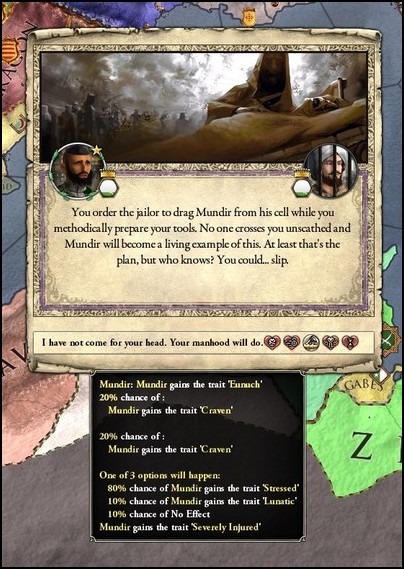
Allah seemed to be out to set an example of his own. A few weeks after Morgana’s death, Azar’s long-awaited first child was finally born, a son by Circe. Az’ar, as any ruler would, had become obsessed with raising an heir of his own, so he had been ecstatic when he heard the news. Unfortunately, however, illness took the newborn boy just hours after he came into the world, cutting short Azar's joy.
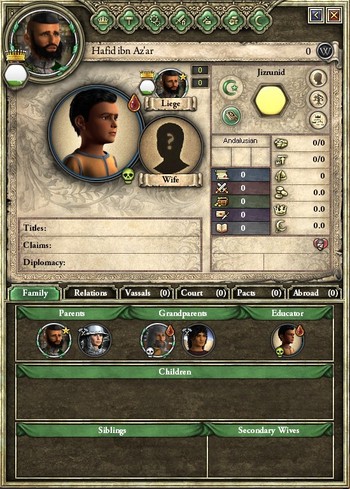
Understandably, after two crushing deaths in such quick succession, Az’ar became desperate to escape from his house of death. Luckily, an excuse to get away from Cádiz came up not long after, with word reaching the palace that Caliph Muqtadi in Baghdad had called for a Great Jihad against the Byzantine Empire.

Az’ar didn’t care much for holy wars, but he pounced on the chance to get away from Cádiz, and perhaps earn a reputation abroad. His council warned him against joining the Jihad, however, on the basis that the distance would be too great a barrier, but the Sheikh simply waved away any concerns and continued his preparations.
Thus, late in 1095, Sheikh Az’ar set out for the Levant with 4000 men-at-arms.

It took only a week for Az’ar to realise he’d made a grievous mistake. The costs of ship reparations, food stores, sail cloth, material upkeep and physical labour were staggering, and within mere days of launching the campaign, Sheikh Az’ar found himself teetering on the edge of bankruptcy.
Nevertheless, he managed to somehow reach Acre in January of 1096, only to be dealt another cruel hand. Basileus Konstantinos had proven himself a gifted commander, defeating the Muslim forces in a series of decisive battles before capturing the Caliph himself, bringing the Jihad to a sudden end.
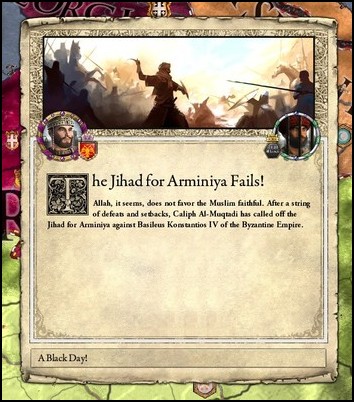
So, as a new century approaches, Az’ar found himself a continent away from Cádiz and without the means of getting back. As his budget went red, he was forced to disband the army, scatter his forces and use the remaining funds to somehow make his way back to Cádiz. Needless to say, the expedition had ended in utter failure.
Even worse, whilst docking at Tunis for supplies, the Sheikh was caught in the midst of disease sweeping through the region. He was rushed back to Cádiz with all the haste of the wind, but by then any hope of a full recovery was dashed, and his Court Physician was forced to work with what was left of him.
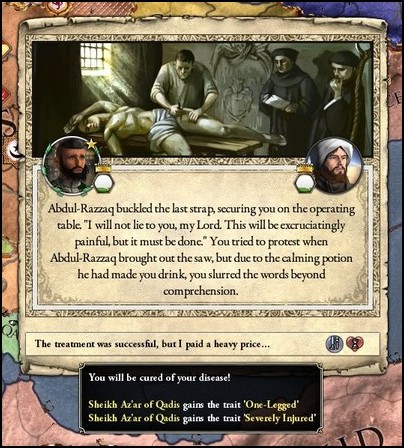
Thus, the brilliant and notorious Sheikh Az’ar returned to Cádiz in humiliation, a cursed cripple with neither an army nor any money. This, the Sheikh was convinced, was surely his lowest point.
The first thing he did upon returning to Cádiz was go to Circe, who had quickly become his favourite (and primary) wife. The witch was understandably shocked at the sight that met her, Az’ar was almost unrecognisable, poor where he’d once been rich, broken where he’d once been strong, and defeated when he’d once stood proud. He was the picture of pity.
She took him into her chambers, and though no one knows what happened between them in those next few hours, evil was certainly worked in those rooms. There were whispers that the witch would sing in demonic music late into the night, and that a harsh, guttural voice would rumble in reply... and when the doors were thrust open once more, Az’ar strode out of the room, but he was not the same man who’d staggered through them just a week past. His body was whole once more.

The nobles, clergymen and scholars took this 'recovery' with a healthy dose of scepticism, but there is no doubt that Az'ar had suddenly returned to his determined and ambitious former self, with the Sheikh immediately drawing up plans to invade the neighbouring Emirate of Granada.
After revealing these plans, however, the clergy outright refused to sanction the invasion, with Imam Mubashir claiming that Sheikh Az’ar had the devil in him. He wasn’t far wrong, and Azar's courtiers began picking up oddities, such as the fact that their Sheikh didn't eat much, or that he spent more nights awake than not, or that he never seemed to laugh or smile. Soon enough, many began whispering that the Sheikh’s miraculous recovery had been bought with the most valuable of Allah’s creations: his soul.
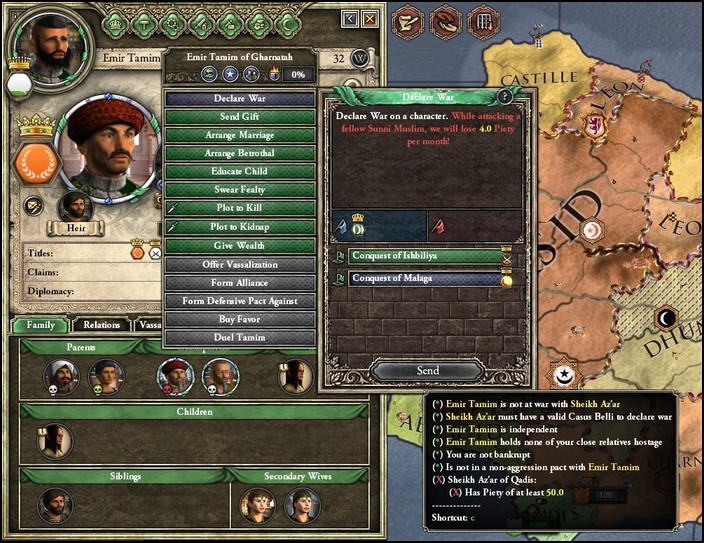
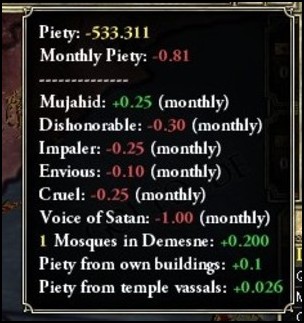
Az’ar, however, had long grown accustomed to such rumours, and simply brushed them off. After the Court Imam refused to preach for war, the Sheikh was forced to resort to more primitive methods: namely, having his viziers falsify documents and claims to lands held by Granada.
Once these documents were ready, Sheikh Az’ar wasted no time in declaring on his neighbour, anxious to feel the rush that came with battle after so long a drought.

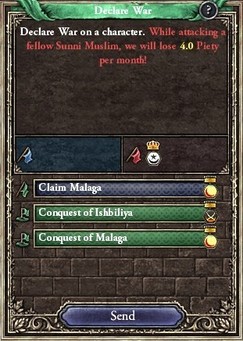
It had been quite a while since he’d last marched to war, but the barracks and military schools throughout Cádiz were kept in good working condition throughout the years of peace, so Az’ar was able to quickly muster his levies and merge them into a large army.
Once fully gathered, the Sheikh set out to meet the Granadan army, which had been recalled from another conflict to defend the Emirate's southern borders. The two armies clashed not far from Cádiz, and Az’ar was able to showcase his unique martial ability once again, surrounding and crushing large parts of the enemy in a series of brilliant manoeuvres, ending the battle with more than 3000 dead or captured foes.
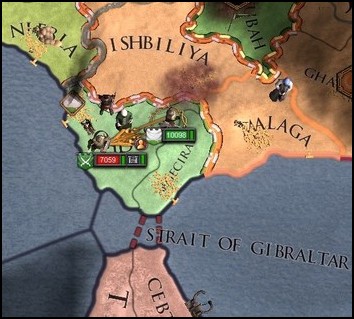
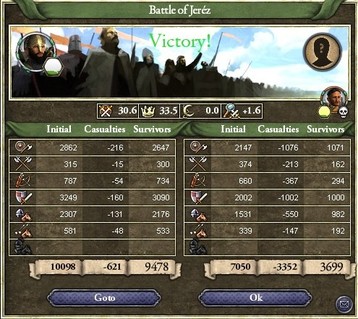
Emir Tamim of Granada was forced to lead a chaotic retreat, with Azar’s forces in close pursuit, constantly raiding and harrying at their supply trains. He managed to pin down the bulk of Tamim's army near Algeciras, crushing it once again.
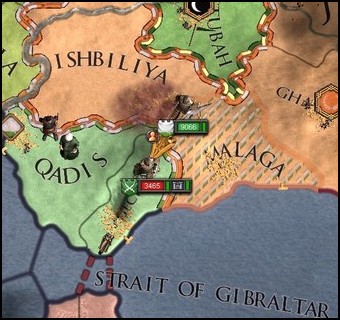
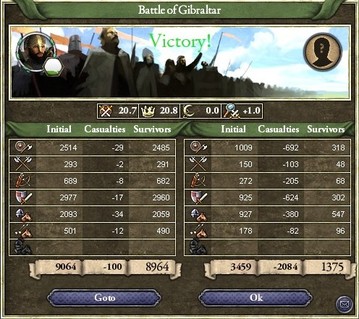
The Emir himself was able to escape the slaughter, but Az’ar pressed close on his heels, chasing Tamim and his escort back to Malaga. The fortress was put under siege, and after a few attempted wall-scalings, Az’ar resigned himself to the fact that he wouldn't be able to pierce its strong fortifications, instead opting to surround it and simply starve it into submission.
The months quickly slipped past, and as the situation inside Malaga became increasingly desperate, Az’ar was able to bargain with the defenders and secure their surrender. In return for promises of clemency and the guaranteed survival of Emir Tamim, the gates of Malaga were finally opened to Sheikh Az'ar.
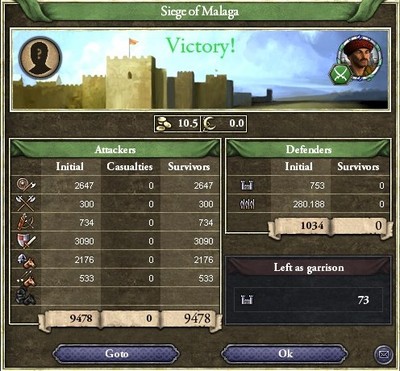
Az’ar is not the sort of man to hold to a promise, however, and he let his army loose on the city within moments of entering it. Malaga was brutally sacked over the course of the night, with no man, woman or child safe from the frustrated Cádizians.
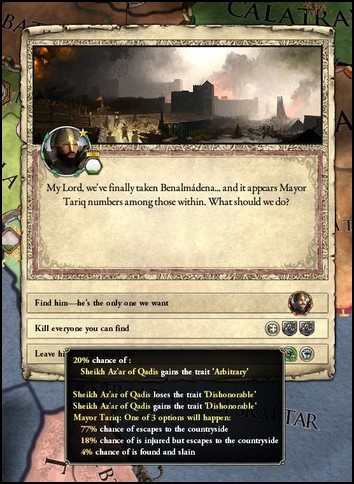
Emir Tamim was captured whilst attempting to escape and brought to Az'ar in chains, but once he signed a treaty ceding Malaga and a few nearby cities, he was allowed to leave in relative safety. That is to say, with a couple new scars and a pronounced limp.
And with that, the small but notorious Sheikh Az’ar expands his dominion once more, but he’s certainly not done. At the encouragement of Circe, he’s determined to build a realm worthy of challenging the Aftasid Sultanate to the north and the Almoravids to the south, though only time can tell whether the so-called Son of Iblis can evade his inevitable fate long enough to achieve it.
